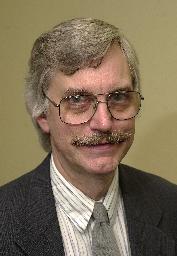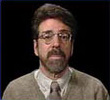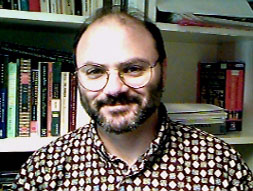Chair, Learning and Technology,
Graduate School of Education, Harvard University
|
How Virtual Interactions Deepen Learning for Real Students |

Both classroom and distance education faculty can benefit by using interactive
media in instruction. Pedagogy in virtual learning settings has expanded beyond
"talking heads" and downloaded readings to include telementoring,
shared virtual environments, collaborative learning, and small-group inquiry.
This talk describes key instructional design issues when faculty use new media
that break the "tyranny of time" in face-to-face interaction and help
students passive in classroom settings to "find their voices."
Christopher Dede is the Chair of Learning and Technology in the Graduate School
of Education at Harvard University. Chris is also the Timothy E. Wirth Professor
in Learning Technologies.
Chris teaches graduate seminars in distributed learning and emerging educational
technologies. He has done research on multi-user virtual environments and developing
'virtual communities of practice'.
|
Realvideo
|
Windowsmedia
|
| 220 Kbps connection | 220 Kbps connection |
| 80 Kbps connection | 80 Kbps connection |
| 56 Kbps connection | 56 Kbps connection |
|
The Math Emporium and Innovations in Teaching with Technology |

Alvin Toffler suggests that for substantive change to occur, several conditions need to be present: great external pressures; internal pressures for change in the existing order; and an alternative plan or vision for change. Certainly, when Virginia Tech launched its faculty development initiative for integrating technology in teaching and learning activities across the university, all three conditions contributed to change. Likewise, when the university decided to develop a large-scale prototype experiment in teaching mathematics with technology, now known as the Math Emporium, the three conditions existed. Other factors also paved the way to transformational changes at this large public research university. Anne Moore will lead a discussion designed to explore some of the paths to substantive change in technology-assisted teaching and learning activities, using cases like the Math Emporium as examples.
Anne is the Associate Vice President for Learning Technologies and Director
of Information Technology Initiatives at Virginia Polytechnic Institute and
State University (Virginia Tech). She is responsible for building partnerships
within the university and with other organizations that assist in meeting modern
needs for technology in society. She heads the university's Learning Technologies
division and coordinates the Center for Innovation in Learning, which provides
grants to faculty and staff for integrating technology into teaching in strategic
curricular areas. She also manages the university's Executive Forum in Information
Technolgy, a seminar series designed to encourage public discussion on current
technology issues.
|
We've got all our courses online; now what? |

For some time now, Euphoric State has been trying to get all its courses online. This lecture will trace that effort to the point where 100% of their courses are online. This was no cause for celebration, however, as it then became clear that the most difficult work was yet to be done.
Note: Euphoric State is Howard's whimsical invention. Any similarity to any real university is purely coincidental.
Hear the talk:
|
Realvideo
|
Windowsmedia
|
| 220 Kbps connection | 220 Kbps connection |
| 80 Kbps connection | 100 Kbps connection |
| 56 Kbps connection | 56 Kbps connection |
|
The Connexions Project |
The Connexions Project is a new approach to authoring, teaching, and learning that fully exploits modern information technology. Available free of charge to anyone under open-content and open-source licenses, Connexions offers custom-tailored, current course material, is adaptable to a wide range of learning styles, and encourages students to explore the links among courses and disciplines. In contrast to the traditional process of textbook writing and publishing, Connexions fosters global communities of authors, instructors, and students, who collaboratively and dynamically fashion "modules" from which courses are constructed.
Preliminary trials with Rice University faculty and students over the past two years have been so successful that the Electrical and Computer Engineering department has resolved to implement a holistic Connexions-based curriculum. They also recently launched a content development community in the area of digital signal processing, with authors from nine leading universities worldwide.
This talk will overview the philosophy and technology behind Connexions and its links with MIT projects such as the Open Knowledge Initiative (OKI) and the OpenCourseWare (OCW) project.
Rich Baraniuk received the B.Sc. degree in 1987 from the University of Manitoba, the M.Sc. degree in 1988 from the University of Wisconsin-Madison, and the Ph.D. degree in 1992 from the University of Illinois at Urbana-Champaign, all in Electrical Engineering. His research interests lie in the area of signal and image processing and include wavelets, natural image modeling, networks, and time-frequency analysis.
|
The Future is Now: Computer-Delivered Assessments in the New Millennium |
While most large-scale tests are still administered in paper-and-pencil format, computer-delivered testing is rapidly making inroads. Dr. Amy Schmidt will discuss issues that need to be considered as computer testing becomes more prevalent, in her talk "The Future is Now: Computer-Delivered Assessments in the New Millennium." Among the topics to be covered: choice of computer testing models, choice of delivery options, use of natural-language processing software to score essays electronically, and the flexibility that computer testing offers in terms of item and task development. Ample time for questions and discussion will be provided.
In addition to overseeing all of the research associated with various tests administered by the College Board, Dr. Schmidt is on the Board of Directors of the Association of Test Publishers, and is actively involved with the National Council of Measurement in Education and the American Educational Research Association. Her research interests include the application of sophisticated statistical models to psychometric problems, as well as the examination of test score validity in a rapidly changing educational environment. She is a reviewer for several educational journals and author of several College Board research reports. She currently teaches an introductory statistics course and a course in classroom assessment for teachers at the Fordham Graduate School of Education.
Hear the talk:
|
Realvideo
|
Windowsmedia
|
| 220 Kbps connection | 220 Kbps connection |
| 80 Kbps connection | 100 Kbps connection |
| 56 Kbps connection | 56 Kbps connection |
| Visible Knowledge: Bridging Expert and Novice Thinking Processes in
the Humanities Tuesday, October 23 3:00 p.m. to 5:00 p.m. Room 4-241 |

Prof. Randy Bass is Executive Director at the Center for New Designs in Learning and Scholarship at Georgetown University. He is also the Director of the American Studies Crossroads Project, an international project on technology and education affiliated with the American Studies Association. In connection with Crossroads, he is the supervising editor of Engines of Inquiry: A Practical Guide for Using Technology to Teach American Studies, and executive producer of the companion video, Engines of Inquiry: A Video Tour of Learning and Technology in American Culture Studies.
In his talk, "Visible Knowledge: Bridging Expert and Novice Thinking Processes in the Humanities," Prof. Bass will explore some of the issues with using both new and old technologies, and certain teaching approaches to transform the nature of learning. Drawing on his own experiences to help students develop a fundamental sense of the thinking processes in American literature and culture studies, he will discuss his goal of bridging expert and novice learning processes, and making these thinking processes visible and usable to students. He will then look at these same issues in the broader context of the Visible Knowledge Project, a five-year scholarship of teaching project that he directs to explore the impact of technology on learning in the humanities.
Hear the talk:
|
Realvideo
|
Windowsmedia
|
| 220 Kbps connection | 220 Kbps connection |
| 80 Kbps connection | 100 Kbps connection |
| 56 Kbps connection | 56 Kbps connection |